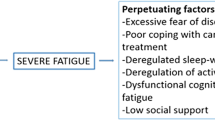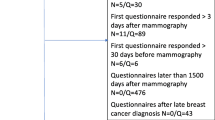Abstract
Goals of work
Studies on fatigue in disease-free breast cancer patients have consistently found a significant association between fatigue and depression; and some characteristics of this fatigue may be confused with and/or concealed by those of depression. To clarify the characteristics of fatigue in disease-free breast cancer patients, we examined the frequency of fatigue and associated factors in disease-free breast cancer patients without major depression.
Patients and methods
Seventy-nine ambulatory breast cancer patients without major depression who had been disease-free for more than 3 years since their surgery completed the Cancer Fatigue Scale (CFS), a multidimensional scale assessing cancer-related fatigue. Participants also completed the Short-form Eysenck Personality Questionnaire–Revised (EPQR) for assessing their personalities. Sociodemographic, physical, and treatment-related factors were also obtained by interview.
Main results
We found that 36.7% of the patients exhibited fatigue and that fatigue was significantly associated with neuroticism.
Conclusions
These results suggest that a considerable number of disease-free breast cancer patients without major depression experience fatigue and that careful attention to those exhibiting high neuroticism may be of benefit in ameliorating their fatigue.
Similar content being viewed by others
Reference
Addington AM, Gallo JJ, Ford DE, Eaton WW (2001) Epidemiology of unexplained fatigue and major depression in the community: the Baltimore ECA follow-up, 1981–1994. Psychol Med 31:1037–1044
Andrykowski MA, Curran SL, Lightner R (1998) Off-treatment fatigue in breast cancer survivors: a controlled comparison. J Behav Med 21:1-18
Bower JE, Ganz PA, Desmond KA, Rowland JH, Meyerowitz BE, Belin TR (2000) Fatigue in breast cancer survivors: occurrence, correlates, and impact on quality of life. J Clin Oncol 18:743–753
Broeckel JA, Jakobsen PB, Horton J, Balducci L, Lyman GH (1998) Characteristics and correlates of fatigue after adjuvant chemotherapy for breast cancer. J Clin Oncol 16:1689–1696
Burstein HJ, Winer EP (2000) Primary care for survivors of breast cancer. New Engl J Med 343:1086–1092
Cella D, Davis K, Breitbart W, Curt G for the Fatigue Coalition (2001) Cancer-related fatigue prevalence of proposed diagnostic criteria in a United States Sample of cancer survivors. J Clin Onc 19:3385–3391
Curt GA, Breitbart W, Cella D, Groopman JE, Horning SJ, Itri LM, Johnson DH, Miaskowski C, Scherr SL, Portenoy RK, Vogelzang NJ (2000) Impact of cancer-related fatigue on the lives of patients: New findings from the fatigue coalition. Oncologists 5:353–360
Eysenck G, Eysenck J, Barrett P (1985) A revised version of the psychoticism scale. Personality and individual differences 6:21–29
Fielder N, Lange G, Tiersky L, DeLuca J, Policastro T, McNeir KK, McWilliams R, Korn L, Natelson B (2000) Stressors, personality traits, and coping of Gulf War veterans with chronic fatigue. Psycho Somatic Res. 48:525–535
Folstein F, Folstein E, McHugh R (1975) ‘Mini-Mental State’ a practical method for grading the cognitive state of patients for clinician. J Psychiat Res 12:189–198
The editorial board of the cancer statistics in Japan (2003) Cancer Statics in Japan. Foundation for promotion of cancer research, Tokyo p. 48–49
Hann DM, Jacobsen PB, Martin SC, Kronish LE, Azzarello LM, Fields KK (1997) Fatigue in women treated with bone marrow transplantation for breast cancer: a comparison with woman with no history of cancer. Support Care Cancer 5:44–52
Hann DM, Jacobsen P, Martin S, Azzarello L, Greenberg H (1998) Fatigue and quality of life following radiation therapy for breast cancer: A comparative study. J Clin Psychol Med Settings 5:19–33
Hosokawa T, Ohyama M (1993) Reliability and validity of the short-form Eysenck Personality Questionnaire–Revised. Psychol Rep 72:823–832
Hursti TJ, Avall-Lundqvist E, Borjeson S, Fredrikson M Furst CJ, Steineck G, Peterson C (1996) Impact of tumor burden on chemotherapy-induced nausea and vomiting. Br J Cancer 74:1114–1119
Mast ME (1998) Correlates of fatigue in survivors of breast cancer. Cancer Nurs 21:136–142
McNair M, Lorr M, Droppleman F (1971) Profile of mood states. Educational and Industrial Testing Service, San Diego
Merlelbach S, Konig J, Sittinger H (2003) Personality traits in Multiple sclerosis (MS) patients with and without fatigue experience. Acta Neurol Scand 107:195–201
Mori E, Mitani Y, Yamadori A (1985) Usefulness of a Japanese Version of the Mini- Mental State Test in neurological patients. Jpn J Neuropsychol 1:82–90
Nakano T, Wenner M, Inagaki M, Kugaya A, Akechi T Matsuoka Y, Sugahara Y, Imoto S, Murakami K, Uchitomi Y (2002) Relationship between distressing cancer-related recollections and hippocampal volume in cancer survivors. Am J Psychiat 159:2087–2093
Nakazato K, Mizuguchi T (1982) Development and validation of Japanese version of State-Trait Anxiety Inventory: a study with female subjects. Jpn J Psychosomatic Medicine 22:107–112
Okuyama T, Akechi T, Kugaya A, Okamura H, Imoto S, Nakano T, Mikami I, Hosaka T, Uchitomi Y (2000) Factors correlated with fatigue in disease-free breast cancerpatients: application of the Cancer Fatigue Scale. Support Care Cancer 8:215–222
Okuyama T, Akechi T, Kugaya A, Okamura H, Shima Y, Maruguchi M, Hosaka T, Uchitomi Y (2000) Development and validation of the cancer fatigue scale: a brief, three- dimensional, self-rating scale for assessment of fatigue in cancer patients. J Pain Symptom Manage 19:5-14
Okuyama T, Tanaka K, Akechi T, Kugaya A, Okamura H, Hosaka T, Nishiwaki Y, Uchitomi Y (2001) Fatigue in ambulatory patients with advanced lung cancer: prevalence, correlated factors, and screening. J Pain Symptom Manage 22:554–564
Prins J, Bleijenberg G, Bazelmans E, Elving LD, Boo TM, Severens J, Wilt GJ, Spinhoven P, Meer JWM (2001) Cognitive behaviour therapy for chronic fatigue syndrome: a multicentre randomised controlled trial. Lancet 357:841–847
Ranchor AV, Sanderman R, Steptoe A, Wardle J, Miedema I, Ormel J (2002) Pre-morbid predictors of psychological adjustment to cancer. Qual Life Res11:101–113
Roelcke U, Kappos L, Lecher-Scott J, Brunschweiler H, Huber S, Ammann W, Plohmann A, Dellas S, Maguire RP, Missimer J, Radu EW, Steck A, Leenders KL (1997) Reduced glucose metabolism in the frontal cortex and basal ganglia of multiple sclerosis patients with fatigue: A 18F- fluorodeoxyglucose positron emission tomography study. Neurology 48:1566–1571
Sammarco A (2001) Perceived social support, uncertainty, and quality of life of younger breast cancer survivors. Cancer Nusing 24:212–219
Servaes P, Prins J, Verhagen S, Blejienberg G (2002) Fatigue after breast cancer and in chronic fatigue syndrome similarities and differences. J Psychosom Res. 52:453–459
Servaes P, Verhagen S, Bleijenberg G (2002) Determinants of chronic fatigue in disease-free breast cancer patients: a cross sectional study. Ann Oncol 13:589–598
Smets EMA, Visser MRM, Garssen B, Frijda NH, Oosterveld P, Haes JCJM (1998) Understanding the level of fatigue in cancer patients undergoing radiotherapy. J Psychosom Res 45:277–293
Spielberger D, Gorsuch L, Lushene E (1970) STAI manual, Consulting Psychologists Press, Palo Alto
Spitzer L, Williams W, Gibbon M, First B (1990) Structured clinical interview for DSM III-R. American Psychiatric Press, Washington DC
Visser MRM, Smets EMA (1998) Fatigue, depression and quality of life in cancer patients: how are they related? Support Care Cancer 6:101–108
Vogelzang NJ, Breiytbart W, Cella D, Curt GA, Groopman JE, Horning SJ, Itri LM, Johnson DH, Scherr SL, Portenoy RK, the fatigue coalition (1997) Patient, caregiver, and oncologist perceptions of cancer-related fatigue: results of a tripart assessment survey. Semin Hematol 34:4–12
Whiting P, Begnall AM, Sowden AJ, Cornell JE, Mulrow CD, Ramirez G (2001) Interventions for the treatment and management of chronic fatigue syndrome. A systematic review. JAMA 286:1360–1368
Wise TN, Mann LS (1994) The relationship between somatosensory amplication, alexithymia, and neuroticism. J Psychosom Res 38:515–521
Yokoyama K, Araki S, Kawakami N, Takesita T (1990) Production of the Japanese edition of Profile of Mood States: (POMS) assessment of reliability and validity. Nippon Koshu Eisei Zasshi37:913–918
Acknowledgements
The authors are grateful to all patients who gave their time so willingly. The authors would also like to acknowledge the collaborative support of the staff of the National Cancer Hospital East, Japan. The authors thank Ms. Yuko Kojima of the Psycho-Oncology Division, National Cancer Center Research Institute East, Japan, for her research assistance. Yuriko Sugawara, Toru Okuyama, Tomohito Nakano, Masatoshi Inagaki, and Yutaka Matsuoka were awarded a Research Resident Fellowship from the Foundation for the Promotion of Cancer Research, Japan.
Author information
Authors and Affiliations
Corresponding author
Rights and permissions
About this article
Cite this article
Sugawara, Y., Akechi, T., Okuyama, T. et al. Occurrence of fatigue and associated factors in disease-free breast cancer patients without depression. Support Care Cancer 13, 628–636 (2005). https://doi.org/10.1007/s00520-004-0763-6
Received:
Accepted:
Published:
Issue Date:
DOI: https://doi.org/10.1007/s00520-004-0763-6




